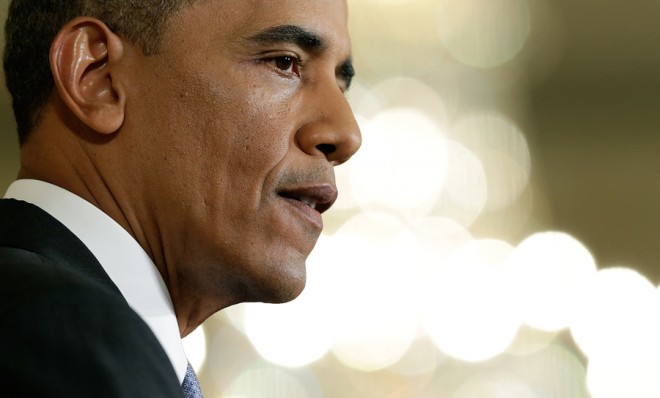Egypt's bloody crackdown: What does Obama do now?
The president faces mounting pressure to hold Egypt's military accountable as blood runs in Cairo's streets


A free daily email with the biggest news stories of the day – and the best features from TheWeek.com
You are now subscribed
Your newsletter sign-up was successful
After a day's worth of bloody violence, Egypt finds itself at a crossroads — as does the administration of President Barack Obama.
The White House on Wednesday condemned the Egyptian military's brutal crackdown on Islamist protesters demanding the reinstatement of ousted president Mohamed Morsi. A spokesman for Obama also criticized the interim Egyptian government for declaring a state of emergency, which gave the army unchecked power to restore order, and said the U.S. would hold Egypt accountable for keeping its promise to restore democracy.
Obama, however, faces mounting pressure to do more. The latest violence, which pitted heavily armed soldiers against rock-throwing civilians, has killed more than 230 people. There have been renewed calls for the U.S. to cut off the $1.3 billion in annual aid it sends to Egypt's military. And Turkey, a valuable NATO ally, went so far as to call for the United Nations and Arab League to intervene to stop the violence.
The Week
Escape your echo chamber. Get the facts behind the news, plus analysis from multiple perspectives.

Sign up for The Week's Free Newsletters
From our morning news briefing to a weekly Good News Newsletter, get the best of The Week delivered directly to your inbox.
From our morning news briefing to a weekly Good News Newsletter, get the best of The Week delivered directly to your inbox.
It doesn't help the U.S. that Mohamed ElBaredei, the interim government's vice president, resigned in protest today, withdrawing crucial liberal support and cementing the impression that the oppressive tactics of the Hosni Mubarak era have returned.
There are plenty of reasons to tread carefully in Egypt. Ending America's military aid to Egypt could remove the only leverage Obama has to steer events in the country. "The country's military would be even harder to influence, and given its current power over the country, this is clearly a dangerous prospect," Khairi Abaza argued this week at CNN.
But an end to the current relationship would also have a direct and deleterious impact on American interests more broadly. An end to aid would threaten the durability of Egypt’s critical peace treaty with Israel, not to mention the current agreement that guarantees the safe and reliable passage of U.S. military ships and equipment through the Suez Canal. [CNN]
That has been the consensus realpolitik stance since Morsi was ousted. But the argument sways fewer and fewer people as horrifying images stream out of Cairo and the death toll rises. Here's Marc Lynch at Foreign Policy:
With blood in Egypt's streets and a return to a state of emergency, it's time for Washington to stop pretending. Its efforts to maintain its lines of communication with the Egyptian military, quietly mediate the crisis, and help lay the groundwork for some new, democratic political process have utterly failed... As long as Egypt remains on its current path, the Obama administration should suspend all aid, keep the embassy in Cairo closed, and refrain from treating the military regime as a legitimate government. [Foreign Policy]
As Andrew Sullivan puts it at The Dish, "There is no way the U.S. can aid a government that guns down its citizens in the streets."
A free daily email with the biggest news stories of the day – and the best features from TheWeek.com
Furthermore, what is the U.S. really getting from all the aid it has provided? Here's Amy Davidson at The New Yorker:
Every side blames the United States for something—talking to Morsi, abandoning Morsi, being too involved or abdicating. But the Egyptian military is the one most responsible for staging a battle on the streets of Cairo today. It is also the one funded, in part, by a billion dollars in American aid every year. Does that money get us a hearing? And does Obama even know what, specifically, he would ask for? [The New Yorker]
Indeed, threatening to withdraw the aid may be the last card Obama has to play, particularly when you consider that Egypt has been the recipient of billions of dollars in additional funding from Sunni autocracies — like Saudi Arabia and the UAE — that are more than glad to see the Muslim Brotherhood on its heels.
Here's The Washington Post in an editorial:
If the United States wishes to have some chance to influence a country that has been its close ally for four decades it must immediately change its policy toward the armed forces. That means the complete suspension of all aid and cooperation, coupled with the message that relations will resume when — and if — the generals end their campaign of repression and take tangible steps to restore democracy. [The Washington Post]
Harold Maass is a contributing editor at The Week. He has been writing for The Week since the 2001 debut of the U.S. print edition and served as editor of TheWeek.com when it launched in 2008. Harold started his career as a newspaper reporter in South Florida and Haiti. He has previously worked for a variety of news outlets, including The Miami Herald, ABC News and Fox News, and for several years wrote a daily roundup of financial news for The Week and Yahoo Finance.
